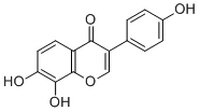531050 Sigma-AldrichPFKFB3 Inhibitor III, YN1 - CAS 75187-63-2 - Calbiochem
A cell-permeable, potent and competitive inhibitor of fructose-2,6-bisphosphatase 3 (PFKFB3; IC₅₀ = 670 nM).
More>> A cell-permeable, potent and competitive inhibitor of fructose-2,6-bisphosphatase 3 (PFKFB3; IC₅₀ = 670 nM). Less<<Synonyms: 7,8-Dihydroxy-3-(4-hydroxyphenyl)-4H-chromen-4-one, 6-Phosphofructo-2-kinase/fructose-2,6-bisphosphatase 3 Inhibitor, YN1
Recommended Products
Overview
| Replacement Information |
|---|
Key Spec Table
| CAS # | Empirical Formula |
|---|---|
| 75187-63-2 | C₁₅H₁₀O₅ |
Products
| Catalogue Number | Packaging | Qty/Pack | |
|---|---|---|---|
| 5.31050.0001 | Sklená flaša | 25 mg |
| References | |
|---|---|
| References | Klarer, A. C., et al. 2014. Cancer Metab. 2, 2. Seo, M., et al. 2011. PLoS ONE 6, e24179. |
| Product Information | |
|---|---|
| CAS number | 75187-63-2 |
| Form | Off-white powder |
| Hill Formula | C₁₅H₁₀O₅ |
| Reversible | Y |
| Quality Level | MQ100 |
| Applications |
|---|
| Biological Information | |
|---|---|
| Primary Target | PFKFB3 |
| Primary Target IC<sub>50</sub> | 670 nM & Ki |
| Purity | ≥98% by HPLC |
| Physicochemical Information | |
|---|---|
| Cell permeable | Y |
| Dimensions |
|---|
| Materials Information |
|---|
| Toxicological Information |
|---|
| Safety Information according to GHS |
|---|
| Safety Information |
|---|
| Product Usage Statements |
|---|
| Packaging Information | |
|---|---|
| Packaged under inert gas | Packaged under inert gas |
| Transport Information |
|---|
| Supplemental Information |
|---|
| Specifications |
|---|
| Global Trade Item Number | |
|---|---|
| Catalogue Number | GTIN |
| 5.31050.0001 | 04055977242522 |
Documentation
PFKFB3 Inhibitor III, YN1 - CAS 75187-63-2 - Calbiochem MSDS
| Title |
|---|
References
| Reference overview |
|---|
| Klarer, A. C., et al. 2014. Cancer Metab. 2, 2. Seo, M., et al. 2011. PLoS ONE 6, e24179. |







